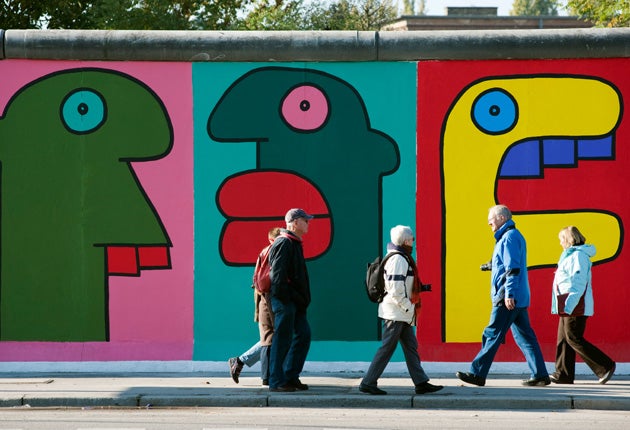Backlash against the backpacker influx to Kreuzberg, Berlin's hippest district

Your support helps us to tell the story
From reproductive rights to climate change to Big Tech, The Independent is on the ground when the story is developing. Whether it's investigating the financials of Elon Musk's pro-Trump PAC or producing our latest documentary, 'The A Word', which shines a light on the American women fighting for reproductive rights, we know how important it is to parse out the facts from the messaging.
At such a critical moment in US history, we need reporters on the ground. Your donation allows us to keep sending journalists to speak to both sides of the story.
The Independent is trusted by Americans across the entire political spectrum. And unlike many other quality news outlets, we choose not to lock Americans out of our reporting and analysis with paywalls. We believe quality journalism should be available to everyone, paid for by those who can afford it.
Your support makes all the difference.Berlin's once run-down district of Kreuzberg has been a symbol of Germany's celebrated alternative culture for decades. It revels in a reputation for riots, ethnic diversity, squatting and "scene" bars and clubs. It has returned a Green MP to parliament for almost as long as its inhabitants can remember.
Now, however, the "right on" residents of arguably the German capital's hippest borough are up in arms over a new threat, posed not by eviction bailiffs, greedy developers or drug busting police, but an apparently insufferable tide of young, back-packing, budget flight tourists.
"The noise they make is unbearable, especially in the summer," complained one resident who lives near Kreuzberg's fashionable Bergmannstrasse in an interview with Der Spiegel magazine. "They play loud Techno music until the early hours of the morning and the children can't sleep."
Kreuzberg's residents complain that swarms of young twenty-something tourists invade the borough especially at weekends and in the summer to stay in an increasing number of cheap hostels or illicitly rented-out apartments. At night they flock to its trendy all-night bars, which are advertised in guide books as a "must for party animals".
The culprits are mostly young British, Scandinavian and Italian tourists coming to the city via easyJet and other budget airlines for mini-break holidays. They are accused of rowdy all-night partying, and offensive drunken behaviour such as leaving trails of broken bottles and vomit in their wake.
Hans Korfmann, the editor and publisher of the borough's Kreuzberg Chronicle magazine, warned recently that much of what used to make Berlin, and especially Kreuzberg, unique threatened to be destroyed by the influx. "There was always a colourful mix of people which included intellectuals, politicians and social security recipients – they all lived here together," he said.
The problem is seen to have worsened to such an extent that the Kreuzberg branch of the borough's influential Green party recently held an emergency meeting. It was advertised with the slogan: "Help – the tourists are coming!" and aimed to gauge residents' feelings about the issue. Hundreds flocked to the event. "We are not a zoo!" was one of the most frequently cited complaints.
"We don't want to build another Berlin Wall around Kreuzberg," explained local Green MP Dirk Behrend, who organised the meeting. "But we want the tourism to be properly organised and controlled."
Kreuzberg's Greens and their supporters point to official statistics which show that the number of tourists visiting Berlin, a city with 3.3 million inhabitants, has risen dramatically in recent years as a result of budget airlines such as Easyjet and Ryanair. More than 9 million visited in 2010 and spent 20 million nights in the city's hotels.
The boom has encouraged developers to invest in cheap hostels where young visitors can sleep in dormitories costing as little as €10 (£8.60) per night. The influx has also helped private holiday lets to rocket with apartment owners gladly renting out rooms or entire flats to tourists, mostly on the black market.
"Berlin has become the capital of holiday lets," said Burkard Kieker, the director of Berlin's tourist marketing agency. He admits that the practice has helped to make apartments scarce and push rents up, but points out that tourism is an essential source of income for a city famously described by Klaus Wowereit, its gay mayor, as "poor but sexy".
Tourists spend an estimated €9m (£7.7m) in Berlin each year. Mr Kieker dismisses as absurd residents' demands that the city government and tourist industry act to direct the flow of visitors away from Kreuzberg. "Berlin is becoming a world city again," he argues. "We have to get used to that."
The trouble with tourists
* Prague: The city's initial satisfaction at the additional income the cheap airlines brought turned to despair at the impact of British tourists. Some hotels stopped taking group visits, while stag groups are banned from many bars. There was even talk of setting up a special branch of tourist police.
* Barcelona: Spain's second city grew so tired of unruly tourists that it launched a campaign to teach them manners. As well as a ban on happy hours, posters went up of men urinating in public crossed out by a red line, with the slogan: "Everything fits here but not everything goes."
* Deauville: Residents of the French seaside town set up a protest group when Ryanair started to fly in. "We are particularly against people who wear T-shirts and bring sandwiches to eat outside the casino," said spokesman Christiane Célice.
Join our commenting forum
Join thought-provoking conversations, follow other Independent readers and see their replies
Comments